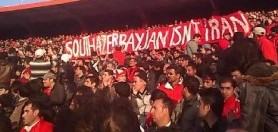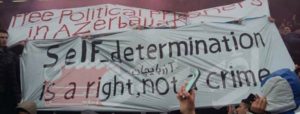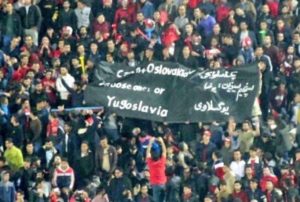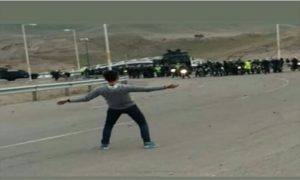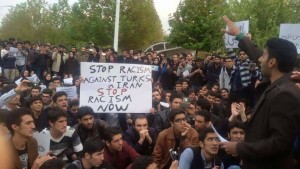South Azerbaijan has demonstrated will and ability to realize its Right to Self- Determination. South Azerbaijan had established democratic self-governance in 1920, 1945 and 1979. The people of South Azerbaijan enjoyed an inordinate political, social, cultural and economic development and preserved its cultural, linguistic, ethnic and territorial identity while self-governed. The people of South Azerbaijan have demonstrated a resilient will to exercise and realize their right to Self Determination. In a free plebiscite, if held today, the vast majority of people of South Azerbaijan would vote for a Self- Governed South Azerbaijan which is the paramount remedy available under international law.
Linguistic and cultural rights
Currently the Azerbaijani Turkish language is suppressed in Iran, even though the Iranian constitution enshrines the right to minority groups to use their own language. The central government, however, prohibits use of Azerbaijani Turkish in schools, and no education is available at any level, and even at the University of Tabriz, where seven other languages are taught. Azerbaijanis want to be able to use their language when in contact with regional authorities and the judicial system, in particular to exercise the basic cultural rights as set out in article 26 of the International Covenant on Civil and Political Rights. Additionally, a number of street and place names have systematically been changed into Farsi. One central problem in the media is that in reality the language used is a version of pseudo-Farsi with Azerbaijani Turkish influences. Therefore, Southern Azerbaijani people have campaigned for media productions to be broadcast in the correct form of the Azerbaijani Turkish language – both on radio and television. There is a strong feeling that the Azerbaijani cultural and historical heritage is being ignored, and even in some cases physically destroyed by bombing to make way for new buildings, in the case with the Ark Castle in Tabriz.
Harassment and imprisonment of Azerbaijani activists
Mass arrests and suppression by Tehran regime have been a common feature of Azerbaijani cultural gatherings, demonstrations, and even sport contests.
According to UN and Amnesty International hundreds of Azerbaijani activists have been jailed, accused of “acting against national security”.
Along with other non-Persian nationalities in Iran, Southern Azerbaijanis suffer from economic discrimination. Discrimination against non-Persian peoples since the 1979 Revolution has been led by the tight centralism of the state built on an ethnic hierarchical system; the economic consequences of this severely influencing the daily lives of non-Persians in Iran.
For instance, strict rules in the financial system and a relentless lack of government investment in the region has contributed to mass emigration from rural areas and finds a flux of more than eight million emigrants living in overcrowded poverty in the capital and other central cities.
Along with routine harassment, economically discriminating policies have been practiced. As a local newspaper disclosed, government investments in industries and mines in Kerman, a central city in Iran, have been 300 times bigger than in the four Azerbaijani provinces.
Turks have dominated and ruled Iran and the lands beyond it for thousands of years, and the northwest of Iran has long been the Azerbaijani Turks’ homeland. However, after the Gajar, the last Azerbaijani kingdom in Iran collapsed, the Pahlavi dynasty dominated Iran and this saw the beginnings of the anti-Turk movement.
As a result, the Iranian government has consistently and repeatedly split Southern Azerbaijan into several different regions and perused a policy of separating the peoples of the region from their native languages and culture. Iran’s regimes have also altered the ethnic demography of the separated provinces of Azerbaijan by relocating groups of Fars into some of the Southern Azerbaijani provinces like Qazvin and Hamadan.
The continuance of the assimilation policy in Southern Azerbaijan by the regime in Tehran has lead to a significant social and national identity crisis. The Iranian government has been running wide spread propaganda against any non-Fars national identity in Iran, so that the ethnic peoples will stop embracing their own traditional cultures and assimilate into the Persian centralised model. Southern Azerbaijani women face double discrimination, since they experience inequality in terms of their gender and also for belonging to a minority group.
The leading members of the New South Azerbaijan National Awakening Movement, Latif Hasani, Ayet Mehrelibegli, Behbud Quluzade, Mahmud Fazli and Shehram Radmehr are sentenced to 9 year in prison and were exiled to Rejayisher prison near Tehran.
Abdullah Sadiqi, Hamid Malikzade, Aziz Purvali, Huseyin Ronagi Maleki, Ali Jabbari, Shahrokh Zamani, Vahid Sheykhbegli, Mehdi Shafiq, Mehdi Kukhian are also jailed for peaceful attempt to secure basic cultural and linguistic rights. Exact number of Azerbaijani prisoners is unknown.
Recently, Abbas Lesani of Ardabil has been sentenced to 8 years in prison and 2 yeasr exile, Kazim Safabakhsha has been senteneced to 13 years prison, also Kiyanush Aslani to 5 years and Tovhid Amini to 9 years in prison merely for distributing some brochures calling the fascistic regime of Tehran to respect the Turks’ and other ethnics’ mother languages.

